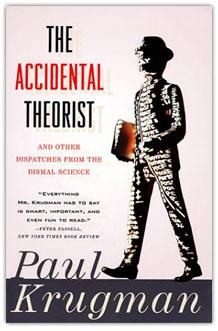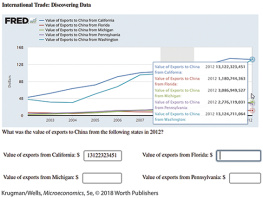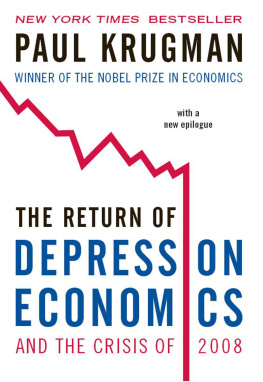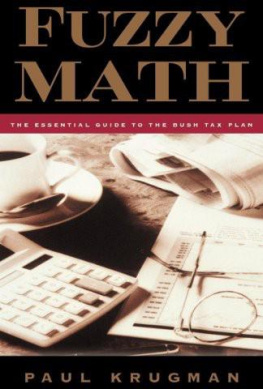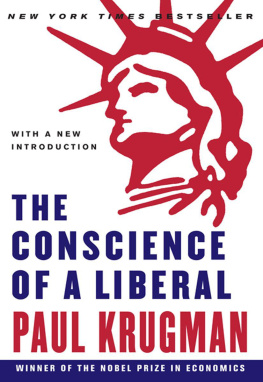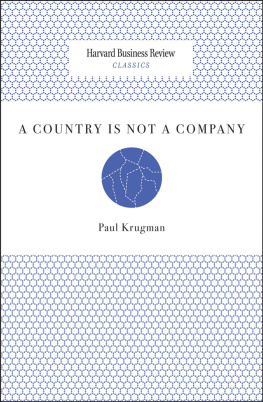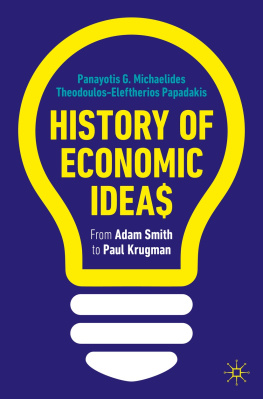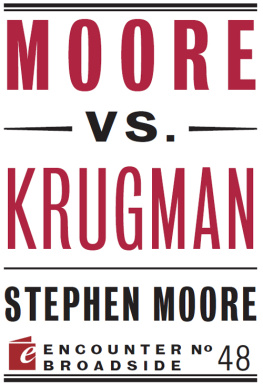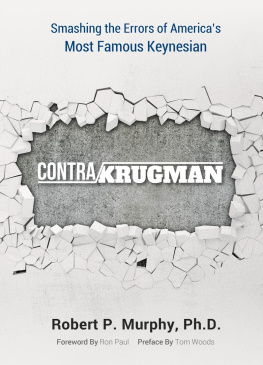W. W. Norton & Company
For information about permission to reproduce selections from this book, write to Permissions, W. W. Norton & Company, Inc., 500 Fifth Avenue, New York, NY 10110.
The text of this book is composed in Adobe Caslon with the display set in Adobe Caslon.
Krugman, Paul.
Paul Krugman.
p. cm.
1. Economics. I. Title.
W. W. Norton & Company, Inc., 500 Fifth Avenue, New York, N.Y. 10110 http://www.wwnorton.com
W. W. Norton & Company Ltd., 10 Coptic Street, London WC1A 1PU
Introduction
Economists are supposed to be boring. And the reputation is justified: Most of us really are quite boring, at least when we talk about our work. But then so are most other people, from scientists to supermodels. Why do economists get singled out?
The answer, I believe, is unrequited longing. Economics matters to peopleit is, as John Maynard Keynes put it, dangerous for good or evil in a way that, say, literary studies or even history are not. People come to economists in search of emotional or political satisfaction. They are therefore dismayed to find a discipline that seems to be all equations, diagrams, and impenetrable jargon.
There are some excuses for that impenetrability. Economics, Keynes wrote elsewhere, is a difficult and technical subject, but nobody will believe it. The central ideas of economic theory are very simple: They boil down to little more than the proposition that people will usually take advantage of opportunities, plus the observation that my opportunities often depend on your actions and vice versa. But applying these ideas to particular casesto the effects of technological progress on employment, of international trade on wages, of the money supply on economic growthrequires some close, hard thinking, thinking in which a bit of math and some specialized jargon can often help you stay on track. This is not to deny that much of what modern economists (or academics of any type) do is pointless technical showboating, using fancy math to say things that could just as well have been expressed in plain Englishor for that matter to say things that would be obviously silly if their meaning were not obscured by the math. But not all of the technicality of modern economics is obscurantism; sometimes it is actually a way to make things clearer and simpler.
Still, there should be a lot more accessible, interesting, even exciting writing about economics than there is. Astronomy is a difficult, technical subject, too; yet where is the economics equivalent of the late Carl Sagan? (Did you know that U.S. consumers spend trillions and trillionsnever mind.) On many issues, including some of those where passions run highest, economics offers startlingly illuminating insights, insights that could with a little effort (all right, with a lot of effort) be explained without the jargon. Yet that explanation is usually not forthcoming. We are a profession without popularizers.
But waitarent there some very influential economic gurus, men whose books routinely grace the best-seller lists? Yes, there are, but they are not popularizers in the proper sense of the word. Sagan was a popularizer: He found a way to make serious astronomythe discoveries and theories of professional astronomerscomprehensible and exciting to a wide audience. Our popular economics writers, however, are not in the business of giving their readers a ringside seat on the research action; with no exception I can think of, they use their books to do an end run around the normal structure of scholarship, to preach ideas that few serious economists share. Often, these ideas are not just at odds with the professional consensus; they are demonstrably wrong, and sometimes terminally silly. But they sound good to the unwary reader. In fact, as far as most people knowincluding people who regard themselves as well-informed, who watch public TV and read intellectual magazinesthat is what economics sounds like.
The essays in this volume represent attempts to do something about that. For most of my professional life I did what most academics do: I taught my classes, wrote papers for professional journals, and in general talked mainly with other academics. As far as I was concerned, getting at the truth and convincing a select audience of cognoscenti that I was right was all that mattered; it was somebody elses job to communicate that truth to the world at large. To be honest, I would go back to those innocent days if I could; in a way I feel that I have been expelled from Eden. But there is no going back, for I have become all too aware that the truth does not, in fact, always prevailthat plausible charlatans can often convince even the great and good that they are men of wisdom, that economic ideas of (it seems to me) self-evident silliness often sound profound to the untrained ear. And I cannot count on somebody else to make the case for the kind of economics I believe in; if I want that case made, Ill have to do it myself.
Luckily, though its a tough job, its not impossible. If you work at it hard enough you can often find a waya parable, a metaphor, a particular angle of approachthat makes a seemingly abstruse piece of economics easily accessible. And there is also a lot of pleasure, of sheer fun in the craft of writing clear English about a technical subject.
And so a few years ago I found myself launched on a sort of second career, writing the sort of pieces that are collected in this book. Often I write articles that use some current issue as their starting point; I also often try either to explode some plausible-sounding idea that happens to be false or to promote some implausible, disturbing idea that happens to be true. But I always have the additional purpose of demonstrating what it means to think, really think, about economics.
This second career has not always made me popular. Many people have strong ideas about economics, partly because our daily experience of getting and spending gives us a (sometimes false) sense of understanding the larger picture, partly because it is so easy to become convinced by economic doctrines that suit our political prejudices. How do people with such strong ideas react when an economist tells them that some things they thought were obviously true are actually quite false, as false as the folk medicine that says that people get ulcers because they worry too much; and that some ideas that they find distasteful are equally unambiguously true, as true as the theory of evolution by natural selection? Perhaps they should be grateful to be thus enlightened; but for some reason they usually arent. Moreover, some influential writers and speakers on economics have spent most of their careers, well, faking it: misrepresenting or even inventing facts, using clever rhetoric to cover gaping logical holes. Neither they nor the people who have been taken in by them are particularly happy to see this pointed out. And some people are simply outraged by the suggestion that economics is even potentially a subject in which hard thinking might force them to question their preconceptionsthat is, wrote one angry op-ed author, an unforgiveable accusation of illiteracy. This was the attitude Keynes was referring to when he wrote that while economics is a difficult and technical subject, nobody will believe it.

